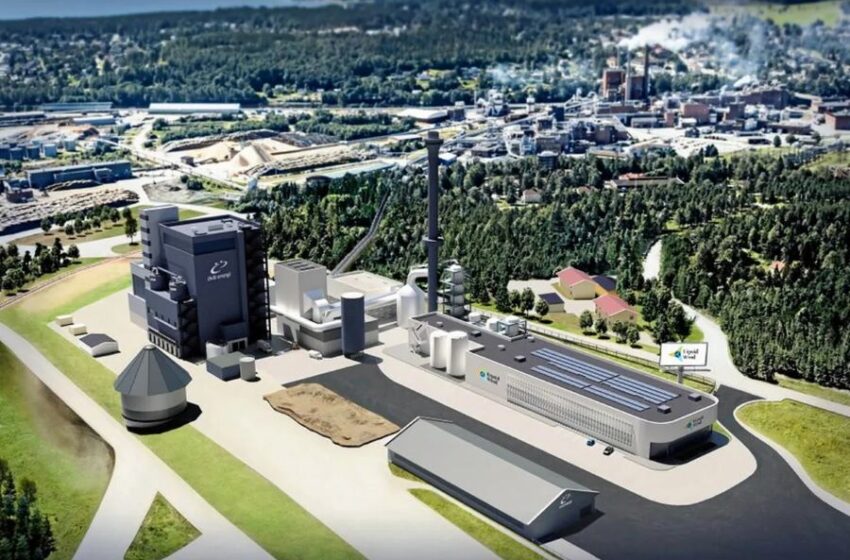
Orsted Scrap Plans to Develop FlagshipOne eMethanol Project
Two years after announcing Final Investment Decision (FID), Danish renewables developer Orsted on Thursday said that it has scrapped plans to develop its FlagshipONE eMethanol project under construction in northern Sweden, citing slow market progress and an inability to sign long-term offtake contracts.
The company took a final investment decision on the project in 2022 after acquiring it from Liquid Wind and was targeting emerging demand in the marine fuel sector. The decision to scrap the project led to cancellation fees of $44 million and impairments of $220 million, the company said.
Mads Nipper, Group President and CEO of Orsted, said that the liquid e-fuel market in Europe was developing slower than expected, and they have taken the strategic decision to de-prioritise their efforts within the market and cease the development of FlagshipONE.
In a statement, Nipper said that they will continue their focus and development efforts within renewable hydrogen, which is essential for decarbonising key industries in Europe and closer to our core business.
“We maintain a strong focus on de-risking project execution and prioritising growth options with the highest potential for value creation. While we were aware of the substantial uncertainties and risks associated with the development of a pioneering and immature liquid e-fuel project and market at the time of the FID, it was a strategic choice to take a leading position in shaping the industry,” Nipper said while releasing the financial results for the first half of 2024.
FlagshipONE in Ornskoldsvik was to make green hydrogen from a 70-MW electrolyser to produce up to 55,000 metric tons per year of e-methanol from 2025 using renewable energy and biogenic CO2 captured from the nearby biomass-fired Horneborgsverket heat and power plant.
“In the first half of the year, we have executed on the updated business plan that we presented in February, and we have put almost 2 GW of renewable energy capacity into operation, providing renewable energy to more than 1.5 million households across three continents. This is a significant contribution to Orsted’s long-term renewable capacity goals,” Nipper said.
Despite encouraging progress on our US offshore wind project Revolution Wind, the construction of the onshore substation for the project has been delayed. This means that Orsted have pushed the commercial operation date from 2025 into 2026, which led to an impairment. This is, of course, unsatisfactory, and we continue our dedicated efforts to de-risk our portfolio, Nipper added.
Demand issues
According to a report from S&P Global, the cancelation of FlagshipONE, previously described by the Danish renewable energy firm as “the largest eMethanol project under construction in Europe,” came as most shipping firms remained reluctant in committing to long-term procurement contracts for methanol produced via sustainable means.
While methanol has emerged as the most popular alternative population in new-build orders over the past year, ship operators are not willing to swallow the high costs of sustainable methanol with limited scope of passing incremental expanse onto their customers, industry participants said.
Platts bunker assessments for 0.5% sulfur fuel oil, the world’s most common type of marine fuel, stood at $13.39/Gj in Rotterdam on Wednesday, compared with $18.01/Gj for fossil-based methanol. Industry estimates suggest sustainable methanol would be at least two to five times more expensive. Platts is part of S&P Global Commodity Insights.
Project Viability
While the EU has extended its Emissions Trading System to cover maritime transportation from 2024 and the International Maritime Organisation could introduce a carbon levy from 2027, most shipping professionals said that the measures would not be able to bridge the price gaps between fossil and synthetic marine fuels until the 2030s at least.
Orsted had previously secured EU funding for the project under the EU-Catalyst program and from the Swedish government, and the company was also expecting to receive a grant from Horizon Europe. However, Orsted told Commodity Insights that no funds had been exchanged at the time of its decision.
The company had previously given a carbon capture contract for the project to Carbon Clean to capture 70,000 t/y of biogenic CO2. Carbon Clean didn’t immediately respond to an email seeking comment on the contract.















